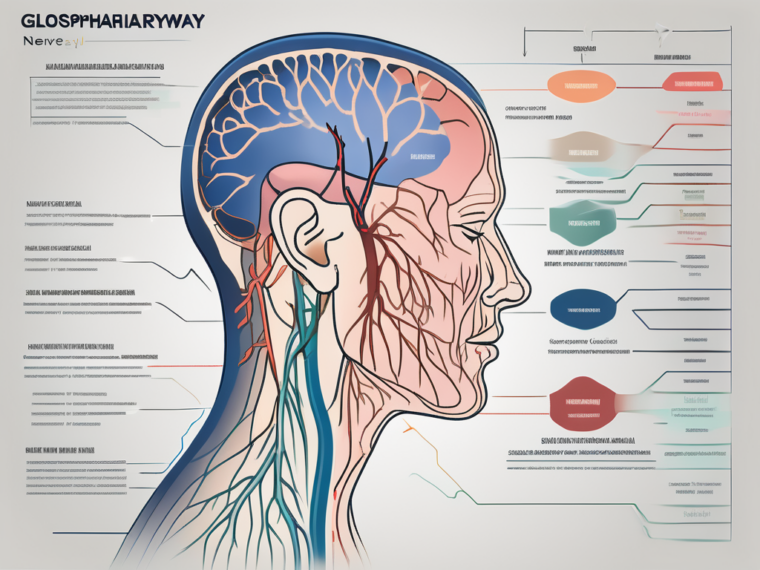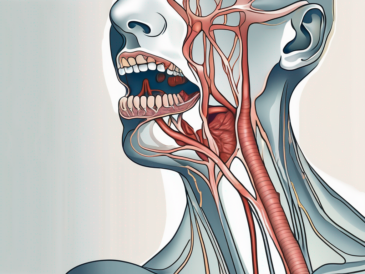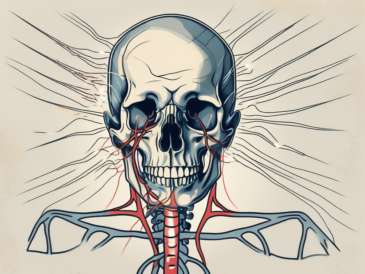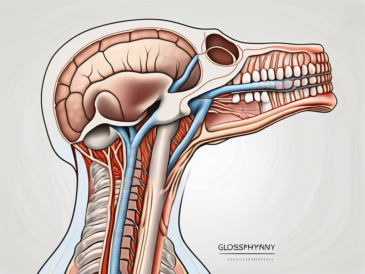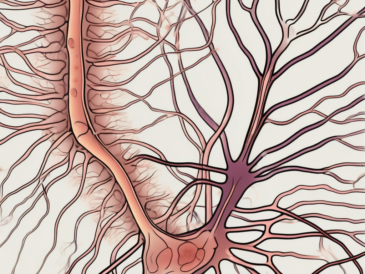The glossopharyngeal nerve is a crucial component of the complex neural network responsible for various functions in the head and neck region. As its name suggests, it innervates both the tongue (glosso-) and the pharynx (-pharyngeal). While pain associated with the glossopharyngeal nerve can be challenging to pinpoint, a thorough understanding of its anatomy and function is essential in order to comprehend the potential sources and manifestations of glossopharyngeal nerve pain.
Understanding the Glossopharyngeal Nerve
The glossopharyngeal nerve, also known as cranial nerve IX, is a fascinating component of the human nervous system. It originates from the medulla oblongata in the brainstem, a vital region responsible for controlling various bodily functions. As one of the twelve cranial nerves, the glossopharyngeal nerve consists of both motor and sensory fibers, making it a multifaceted and intricate structure.
Anatomy of the Glossopharyngeal Nerve
Let’s delve deeper into the anatomy of this remarkable nerve. The sensory fibers of the glossopharyngeal nerve play a crucial role in transmitting sensations from specific areas of our body. These areas include the posterior third of the tongue, tonsils, throat, and even parts of the ear. By relaying sensory information from these regions to the brain, the glossopharyngeal nerve allows us to experience taste, feel sensations in the throat, and perceive certain sounds.
On the other hand, the motor fibers of the glossopharyngeal nerve are responsible for controlling various muscles involved in the complex process of swallowing. Without the coordinated efforts of these motor fibers, swallowing would be an arduous and inefficient task. The glossopharyngeal nerve ensures that the muscles involved in swallowing work harmoniously, allowing us to effortlessly consume food and liquids.
Function of the Glossopharyngeal Nerve
Now that we have explored the anatomy of the glossopharyngeal nerve, let’s dive into its remarkable functions. One of the primary roles of this nerve is to facilitate taste sensation. The glossopharyngeal nerve carries information from the taste buds located on the posterior third of the tongue to the brain. This intricate connection enables us to savor and differentiate the flavors of various foods and beverages, adding richness to our culinary experiences.
In addition to its involvement in taste perception, the glossopharyngeal nerve also plays a vital role in salivation. By stimulating the salivary glands, this nerve ensures the production of saliva, which is essential for the initial stages of digestion. The presence of saliva not only aids in the breakdown of food but also facilitates the smooth movement of chewed food through the esophagus during swallowing.
Furthermore, the glossopharyngeal nerve is instrumental in monitoring blood pressure. It carries important information from specialized receptors located in the carotid sinus, a small area in the neck that helps regulate blood pressure. By relaying this information to the brain, the glossopharyngeal nerve contributes to maintaining the delicate balance of our cardiovascular system.
Overall, the glossopharyngeal nerve is a remarkable component of our nervous system, with its intricate anatomy and diverse functions. From taste perception to salivation and blood pressure regulation, this nerve plays a crucial role in our daily lives, often working behind the scenes to ensure the smooth functioning of essential bodily processes.
The Connection Between the Glossopharyngeal Nerve and Pain
How the Glossopharyngeal Nerve Transmits Pain
While the glossopharyngeal nerve is primarily responsible for transmitting sensory information related to taste, it can also be involved in carrying pain signals. This intricate nerve, also known as the ninth cranial nerve, originates in the brainstem and branches out to innervate various regions of the head and neck.
When there is a source of pain in the areas innervated by the glossopharyngeal nerve, such as the throat or tonsils, these pain signals can travel through the nerve fibers, resulting in glossopharyngeal nerve pain. The nerve fibers act as messengers, relaying the information of discomfort from the affected area to the brain, where it is interpreted as pain.
The transmission of pain signals through the glossopharyngeal nerve involves a complex interplay of specialized cells and chemical messengers. Nociceptors, which are sensory receptors that respond to harmful stimuli, play a crucial role in detecting and initiating the pain signals. Once activated, these nociceptors send electrical impulses along the glossopharyngeal nerve fibers, which then propagate towards the brain.
Conditions that Cause Glossopharyngeal Nerve Pain
There are several conditions that can potentially lead to glossopharyngeal nerve pain. These may include infections, such as tonsillitis or pharyngitis, as well as inflammation or irritation of the nerve itself. Infections can trigger an immune response, leading to swelling and inflammation in the throat or tonsils. This inflammation can then affect the glossopharyngeal nerve, causing pain.
Glossopharyngeal neuralgia is another condition that can result in glossopharyngeal nerve pain. It is a rare disorder characterized by recurring episodes of severe pain in the throat, tongue, ear, and tonsil area. The exact cause of glossopharyngeal neuralgia is not fully understood, but it is believed to be related to irritation or compression of the glossopharyngeal nerve by blood vessels or other structures.
Tumors, although rare, can also contribute to glossopharyngeal nerve pain. When a tumor develops in the head or neck region, it can exert pressure on the glossopharyngeal nerve, leading to pain and other neurological symptoms. Trauma, such as a direct injury to the throat or neck, can also damage the glossopharyngeal nerve and result in persistent pain.
Understanding the connection between the glossopharyngeal nerve and pain is crucial for diagnosing and managing conditions that affect this intricate neural pathway. By identifying the underlying cause of glossopharyngeal nerve pain, healthcare professionals can develop targeted treatment plans to alleviate discomfort and improve the overall well-being of individuals experiencing such pain.
Symptoms of Glossopharyngeal Nerve Pain
Physical Symptoms
Glossopharyngeal nerve pain can manifest in various physical symptoms. Individuals may experience a sharp or stabbing pain in the throat, ear, tongue, or tonsils. This pain can be accompanied by difficulty swallowing, hoarseness, or changes in the sense of taste. Some individuals may also notice increased salivation or a sensation of a lump in the throat.
In addition to these symptoms, glossopharyngeal nerve pain can also cause other physical manifestations. Some individuals may experience a tingling or numbness sensation in the affected areas. This can be accompanied by muscle weakness or a feeling of tightness in the throat. These physical symptoms can vary in intensity and duration, making it important to seek medical attention for proper diagnosis and treatment.
Furthermore, glossopharyngeal nerve pain can have an impact on daily activities and overall quality of life. Individuals may find it challenging to eat, drink, or speak due to the discomfort and pain. This can lead to weight loss, dehydration, and social isolation. Seeking medical help and implementing appropriate pain management strategies can help alleviate these physical symptoms and improve overall well-being.
Emotional and Psychological Symptoms
Living with glossopharyngeal nerve pain can be emotionally and psychologically challenging. The persistent and debilitating pain can lead to feelings of frustration, anxiety, and depression. Individuals may find it difficult to engage in activities they once enjoyed or maintain social relationships due to the constant discomfort and limitations caused by the pain.
Moreover, the emotional and psychological impact of glossopharyngeal nerve pain can extend beyond the individual experiencing the pain. Family members and loved ones may also feel helpless, frustrated, or anxious as they witness their loved one’s struggle with chronic pain. It is important to seek support from healthcare professionals and loved ones to help cope with these emotional aspects of living with chronic pain.
Additionally, managing the emotional and psychological symptoms associated with glossopharyngeal nerve pain is crucial for overall well-being. Engaging in relaxation techniques, such as deep breathing exercises or meditation, can help reduce stress and promote a sense of calm. Seeking therapy or counseling can also provide a safe space to express emotions and develop coping strategies to navigate the challenges of living with chronic pain.
In conclusion, glossopharyngeal nerve pain not only presents with physical symptoms but also has a significant impact on emotional and psychological well-being. It is important to address both the physical and emotional aspects of this condition to improve overall quality of life and promote holistic healing.
Diagnosis of Glossopharyngeal Nerve Pain
Medical History and Physical Examination
Diagnosing the cause of glossopharyngeal nerve pain often begins with a comprehensive medical history review and a thorough physical examination. Your healthcare provider will ask about your symptoms, medical conditions, and any relevant past experiences. They will also assess the affected areas, such as the throat and neck, to identify potential signs of inflammation or abnormality.
During the medical history review, your healthcare provider may inquire about any recent infections or injuries that could be contributing to your glossopharyngeal nerve pain. They will also ask about your overall health, including any chronic conditions or medications you are currently taking. By gathering this information, your healthcare provider can better understand the potential causes of your pain and develop an appropriate diagnostic plan.
Following the medical history review, a thorough physical examination will be conducted. Your healthcare provider will carefully examine your throat and neck, looking for any visible signs of inflammation, swelling, or other abnormalities. They may gently palpate the affected areas to assess for tenderness or pain. Additionally, they may evaluate your range of motion in the neck and jaw to identify any limitations or discomfort.
Diagnostic Tests and Procedures
In some cases, additional diagnostic tests and procedures may be necessary to determine the exact cause of glossopharyngeal nerve pain. These may include imaging studies like magnetic resonance imaging (MRI) or computed tomography (CT) scans to visualize the structures in the head and neck region. These imaging techniques can provide detailed images of the nerves, blood vessels, and surrounding tissues, helping to identify any potential sources of nerve compression or damage.
During an MRI or CT scan, you will lie on a table that slides into a large, tunnel-like machine. It is important to remain still during the procedure to ensure clear and accurate images. The machine will emit a series of loud noises as it captures the images, but earplugs or headphones may be provided to help minimize any discomfort or anxiety.
In addition to imaging studies, nerve conduction studies or electromyography (EMG) may be recommended to assess the functioning of the glossopharyngeal nerve. These tests involve the use of small electrodes that are placed on the skin near the affected area. The electrodes deliver small electrical impulses to stimulate the nerve and record its response. This information can help determine if there is any nerve damage or dysfunction contributing to your pain.
During a nerve conduction study, you may experience a mild tingling or twitching sensation as the electrical impulses are delivered. It is important to communicate any discomfort or pain to the healthcare provider performing the test. EMG involves the insertion of a fine needle electrode into the muscle near the affected nerve. This may cause some temporary discomfort or soreness, but it is generally well-tolerated.
Once the medical history review, physical examination, and any necessary diagnostic tests are complete, your healthcare provider will analyze the collected information to form a diagnosis. This diagnosis will guide the development of an individualized treatment plan to address your glossopharyngeal nerve pain and improve your overall quality of life.
Treatment Options for Glossopharyngeal Nerve Pain
Medications and Therapies
Treatment for glossopharyngeal nerve pain aims to alleviate symptoms and address the underlying cause of the pain. This may involve medications, such as analgesics, anticonvulsants, or antidepressants, to manage pain and reduce nerve sensitivity.
Analgesics, commonly known as painkillers, can help provide temporary relief from glossopharyngeal nerve pain. They work by blocking the transmission of pain signals to the brain. Nonsteroidal anti-inflammatory drugs (NSAIDs), such as ibuprofen or naproxen, can also be used to reduce inflammation and relieve pain.
Anticonvulsants, such as gabapentin or pregabalin, are often prescribed to manage nerve pain. These medications work by stabilizing overactive nerve cells, reducing the transmission of pain signals. Antidepressants, such as tricyclic antidepressants or selective serotonin reuptake inhibitors (SSRIs), may also be used to alleviate glossopharyngeal nerve pain. They can help regulate the brain’s perception of pain and improve mood, which can indirectly reduce pain levels.
In addition to medications, physical therapy or speech therapy can also be beneficial in improving swallowing function and addressing associated muscle weakness or dysfunction. Physical therapists can provide exercises and techniques to strengthen the muscles involved in swallowing, while speech therapists can help individuals regain proper control and coordination of the muscles used for speech and swallowing.
Surgical Interventions
In severe cases or when conservative treatments fail to provide relief, surgical interventions may be considered. Surgical options can include decompression of the glossopharyngeal nerve, where the surrounding structures are relieved to reduce pressure on the nerve.
During decompression surgery, the surgeon may remove or reposition any structures that are compressing the glossopharyngeal nerve, such as blood vessels or tumors. This can help alleviate the pain and restore normal nerve function. The procedure is typically performed under general anesthesia, and recovery time can vary depending on the individual and the extent of the surgery.
In some instances, patients may undergo nerve blocks or surgical nerve ablations to interrupt the pain signals carried by the glossopharyngeal nerve. Nerve blocks involve injecting a local anesthetic or a medication that blocks pain signals directly into the affected nerve. This can provide temporary relief and help identify the source of the pain. Surgical nerve ablations, on the other hand, involve using heat or cold to destroy the nerve fibers responsible for transmitting pain signals. This procedure is usually reserved for cases where other treatments have failed to provide relief.
It is important to note that surgical interventions carry risks and should only be considered after a thorough evaluation by a healthcare professional. The decision to undergo surgery should be made in collaboration with the individual’s healthcare team, taking into account the severity of the pain, the potential benefits, and the individual’s overall health.
Living with Glossopharyngeal Nerve Pain
Glossopharyngeal nerve pain, also known as glossopharyngeal neuralgia, is a condition characterized by recurring episodes of severe pain in the throat, tongue, and ear. This debilitating condition can greatly impact a person’s quality of life, making it important to explore various coping mechanisms and treatment options.
Lifestyle Changes and Home Remedies
Coping with glossopharyngeal nerve pain often involves making lifestyle changes and incorporating home remedies to manage symptoms. While these methods may not provide a complete cure, they can help alleviate discomfort and improve daily functioning.
One common approach is the use of warm compresses or ice packs applied to the affected area. The application of heat can help relax muscles and relieve tension, while cold packs can reduce inflammation and numb the area, providing temporary relief from pain.
In addition to temperature therapy, gentle neck stretching exercises can also be beneficial. These exercises help improve flexibility and reduce muscle tightness, which may contribute to nerve pain. It is important to consult with a healthcare professional or physical therapist to ensure that these exercises are performed correctly and safely.
Another lifestyle change that may prove helpful is adjusting one’s diet. Some individuals find that consuming soft or pureed foods, such as soups or smoothies, reduces the strain on the throat and tongue, minimizing pain during eating and swallowing.
Furthermore, stress management techniques can play a significant role in minimizing glossopharyngeal nerve pain. Practices such as relaxation exercises, deep breathing, meditation, or mindfulness can help reduce stress levels, which may contribute to the intensity and frequency of pain episodes.
Support and Resources for Patients
Living with glossopharyngeal nerve pain can be challenging, both physically and emotionally. It is essential for individuals to seek support from healthcare professionals, patient support groups, or online communities to find solace and understanding.
Healthcare professionals, such as neurologists or pain specialists, can provide valuable guidance and expertise in managing glossopharyngeal neuralgia. They can offer personalized treatment plans, including medications, nerve blocks, or surgical interventions, tailored to the individual’s specific needs.
Patient support groups and online communities can also be invaluable resources for individuals living with glossopharyngeal nerve pain. These platforms allow individuals to connect with others who share similar experiences, providing a sense of belonging and understanding. Through these communities, individuals can share personal stories, exchange coping strategies, and offer emotional support to one another.
While this article provides an overview of the potential sources and manifestations of glossopharyngeal nerve pain, it is important to remember that each individual is unique. If you are experiencing symptoms consistent with glossopharyngeal nerve pain, it is crucial to consult with a healthcare professional for an accurate diagnosis and appropriate treatment plan tailored to your specific needs.
Remember, you are not alone in your journey. With the right support and resources, it is possible to manage glossopharyngeal nerve pain and improve your overall well-being.
